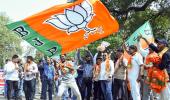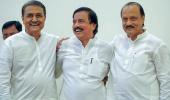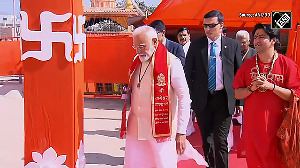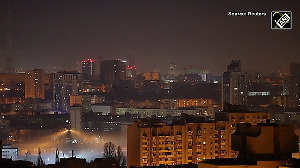In doing so, it further cemented the community's determination to support the Opposition.
But at the same time, it consolidated its Hindu vote bank like never before.

If there's one lesson to be gleaned from the Maharashtra election results it is that a ruling party can win over a disenchanted electorate if it uses the vast resources at its command wisely.
That's what the ruling coalition in Maharashtra did.
The Mahayuti (BJP-Shiv Sena-NCP) used both the public money that it controlled, as well as the cadre that the BJP draws its strength from.
The Laadki Bahin Yojna and the RSS were both indispensable to the spectacular performance of the BJP and its partners in the assembly elections.
***
The Laadki Bahin scheme, that promised Rs 1,500 a month to women whose families earned less than Rs 2.5 lakh a year, was announced by the Maharashtra government in August, two months after the Lok Sabha elections which the ruling alliance lost, and three months before the crucial assembly elections.
The scheme was launched with fanfare and propagated widely. Ruling party politicians went out of their way to help women with the necessary paperwork, and banks were told to give priority to it.
Just before Diwali, the government announced a 'Diwali bonus' -- two instalments of the scheme would be given together. By the eve of Diwali, most women had received Rs 7,500 in their accounts.
This was also a time when food inflation, specially regarding staples of diet such as onions, potatoes, tomatoes, dal and garlic, was at its peak.
The elections showed an upswing in women voters. It's obvious who they voted for.

***
This election saw another zealous campaign on the ground, one aimed at getting BJP voters to the booth.
The result: A 65% turnout, the highest in the state since 1995.
Credit goes to the BJP's parent body, the RSS.
At an informal media meet hosted by the RSS in October, the organisation laid bare its strategy: All its 36 wings would work in their respective fields and go door-to-door, first, to motivate Hindus to vote; second, to persuade them to vote for a 'nationalist' party that would work for Hindu interests.
This campaign was their way of countering what they saw as Muslim zeal to vote for the MVA in the Lok Sabha elections, a key factor, according to them, in the MVA's victory.

The thrust of the RSS campaign was highlighting the 'dangers' of not voting and thereby allowing the MVA to come to power in Maharashtra. These 'dangers' included attacks on Hindu festivals, and dropping the amendments to the recently introduced Wakf Bill, which were aimed at weakening the powers of Wakf boards.
This reporter got a glimpse of this campaign at a meeting held inside a temple in Vikhroli, north east Mumbai, in the last days of the assembly campaign, addressed by Madhavi Latha. She had fought the Lok Sabha election against AIMIM chief Asaduddin Owaisi from Hyderbad on a BJP ticket and lost.
Latha's speech was a study in distilling fear into the minds of her listeners, convincing them through a mixture of songs and high-pitched emotional arguments that their daughters and their properties were not safe if the MVA came to power because they would allow Muslims to grab them.
The police were present at this meeting; however, Madhavi Latha was not stopped at any point nor was any case registered with the Election Commission against her for seeking votes in the name of religion.

***
There is one more takeaway from these election results: That Muslims continue to support the MVA.
Abu Asim Azmi's victory from Mankhurd Shivaji Nagar in north east Mumbai is just one proof of this support. Widely unpopular in this Muslim-dominated constituency, for having done little in the 15 years of his tenure as an MLA, he won by 12,000 votes against a first-time contestant, Ateeque Ahmed Khan of the AIMIM.
"Majboori se unko vote diya (We voted for him out of compulsion)," was the refrain among voters. They could not vote for his opponent Nawab Malik, also a three-time MLA, even though they wanted to, because a vote for him meant a vote for the BJP, since Malik's party, Ajit Pawar's NCP, is part of the BJP-led Mahayuti.
In other Muslim-dominated constituencies such as Byculla in south central Mumbai and Versova, relatively unknown Shiv Sena (UBT) candidates won against sitting MLAs of the Mahayuti.
Muslims in Vandre East, north west Mumbai, even rejected a candidate from their own community. Ex-Congress MLA Zeeshan Siddique, who switched to the NCP, lost to the UBT's Varun Sardesai despite the latter being a newcomer, and despite the sympathy that existed among Muslims over the killing of Siddique's father Baba Siddique last month.
The BJP made Muslim support for the MVA an election issue. Ironically, in doing so, it further cemented the community's determination to support the opposition. But at the same time, it consolidated its Hindu vote bank like never before.
Feature Presentation: Aslam Hunani/Rediff.com











 © 2025
© 2025